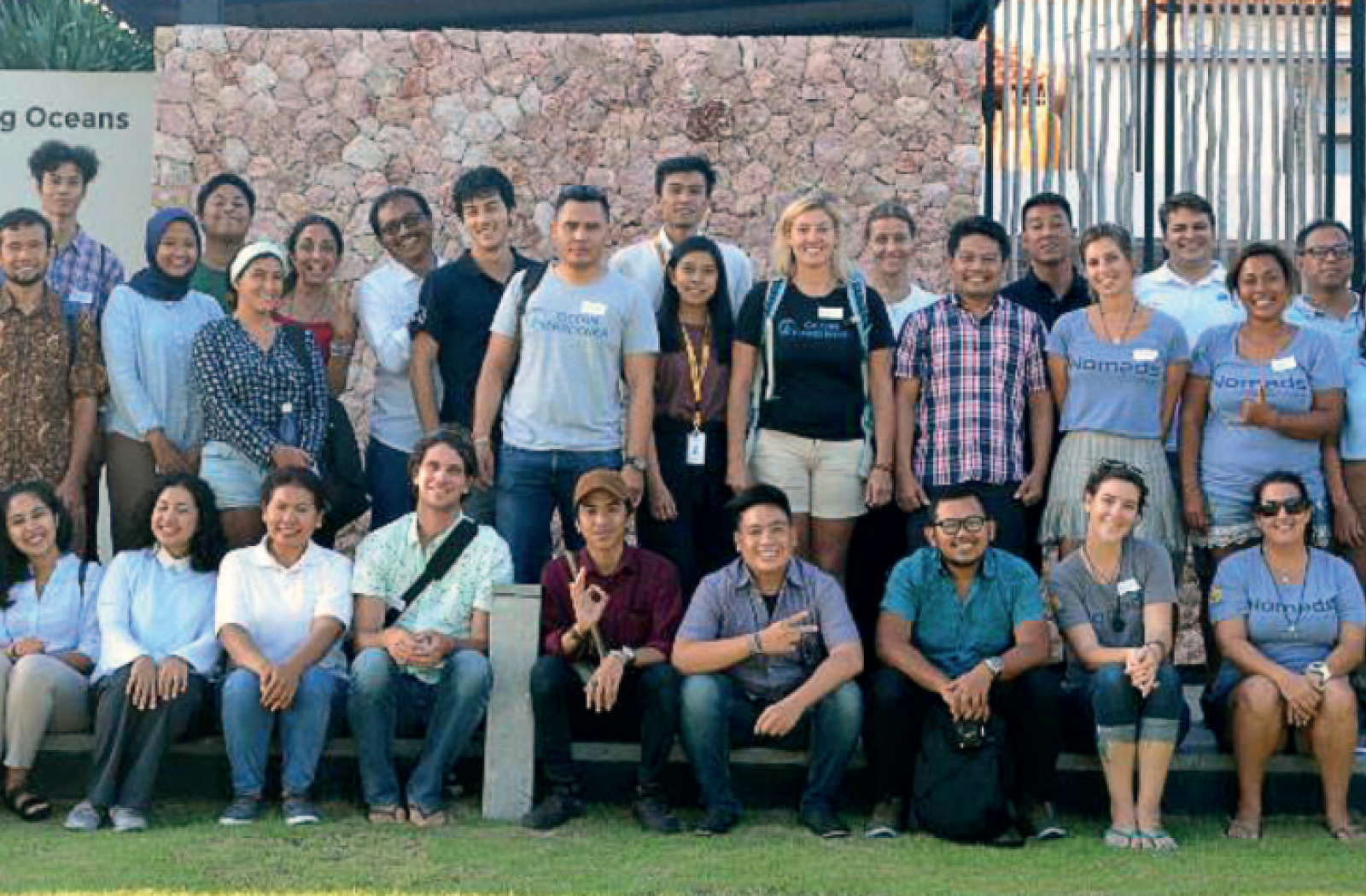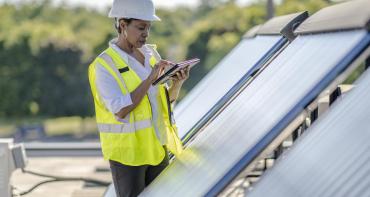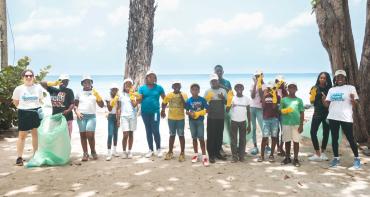The Commonwealth Blue Charter is highlighting case studies from the Commonwealth and beyond, as part of a series to spotlight best practice successes and experiences.

Share your own case study with us
“Restoration has become a central topic in the global discussion on how to address threats to coral reefs. In Bali, numerous private and public initiatives have been undertaken to restore coral reefs. The Bali Reef Rehabilitation Network is intended to connect practitioners for the purpose of sharing information, encouraging best practices and facilitating collaboration on restoration projects that benefit Bali’s marine environment and people.”
– Rili Djohani, Executive Director, Coral Triangle Centre
Summary
The Bali Reef Rehabilitation Network is a coalition of non-governmental organisations, government representatives, academics and marine tourism operators who are engaged in coral reef rehabilitation projects around Bali. The Network was launched in August 2019 when participants met to discuss innovations, challenges, best practices, regulations and other relevant topics. As mounting human pressures degrade and threaten coral reefs, interest has grown among governments, coastal communities and marine enthusiasts to proactively counteract these by initiating projects to restore degraded sections of reef. These well-meaning projects, however, stand to fail and even cause environmental damage if conducted without planning that takes into account ecological, financial, social and legislative factors. The Reef Rehabilitation Network was formed with the goal of sharing knowledge and information among people with diverse backgrounds and levels of experience regarding coral restoration.
While this is a very new initiative, the Network has been presented as a demonstration of a mechanism to try and address challenges of inappropriate restoration, using local peer learning network to share experience and provide peer group support. This is presented as model that may be of interest to members of the Action Group.
The issue
Bali’s economy depends strongly on marine tourism, every year drawing thousands of divers and snorkelers to its reefs. As depressing news of climate change and the global decline of coral reefs fills traditional and social media, tourists are increasingly looking for ways to “do good” on their holiday. Coral planting and other activities related to coral reef restoration have grown in popularity recently, as tourists will pay significant sums of money for the hands-on experience. This demand, presumably combined with a genuine interest in environmental stewardship, has encouraged organisations around Bali to initiate restoration projects, many of which involve tourists in some stage of the process. Many of these projects, however, have been executed without sufficient knowledge and planning regarding the ecological, financial and social factors that contribute to successful environmental restoration. Many restoration practitioners, too, are unfamiliar with local and national laws regarding coral restoration in Indonesia.
The response
In early August 2019, the Coral Triangle Center (CTC) convened a discussion forum as a first step toward establishing a community of practice for reef restoration around Bali. Over 40 participants representing 18 organisations attended. The meeting was intended to introduce a diverse group of participants from different sectors – non-governmental organisations (NGOs), government, marine tourism and academia – with different levels of experience in reef restoration. After a keynote talk delivered by a university affiliate experienced in restoration, each participating organisation was invited to give a five-minute overview of their restoration project. Then, participants discussed challenges related to reef rehabilitation, including:
- Project continuity and building capacity of local communities to participate in reef rehabilitation activities;
- Sources of funding and creating projects that last;
- Coral species and genetic and morphological biodiversity;
- Maintenance of coral nurseries and transplant sites;
- Monitoring and evaluation of project success;
- Coastal water pollution and waste management;
- Site and coral species suitability for reef rehabilitation;
- Unclear regulations, including need for permits;
- Regulations that were written for commercial export of corals but that, by default, apply to restoration projects; and
- Lack of knowledge leading to ecologically inappropriate restoration strategies (e.g. propagating a coral species that does not naturally grow at the depth of the restoration site).
Participants expressed an interest in future activities like touring different project sites and a working group to summarise relevant laws. Facebook and WhatsApp groups were established to encourage further interaction among participants.
Partnerships and support
A coalition of NGOs, government agencies, marine tourism businesses and academics that are actively involved in reef restoration projects around Bali are involved in the Network. CTC staff coordinated and provided funding and the venue to host the August 2019 meeting. CTC staff also set up and monitors the Facebook and WhatsApp groups. The timeframe of this project is open, as it is hoped that the community of practice will continue to persist and expand.
Results, accomplishments and outcomes
The WhatsApp group has 21 members and the Facebook group has 45. Members share and discuss relevant news stories, coral restoration techniques and events (e.g. coral spawning) around Bali. No further activities have been initiated since the discussion forum, though since the meeting there has been talk of organising project site visits, workshops and other activities in the future.
Challenges
One of the main challenges the Network now faces is lack of attention and time: since the initial discussion forum, enthusiasm to participate and initiate activities has waned. Some consideration is still needed as to how to energise the group, aside from initiating and participating in discussions in the Facebook and WhatsApp groups. Another challenge is language: the group involves expatriates as well as Indonesians, not all of whom are bilingual. Some expatriate participants expressed frustration at not understanding presentations in Indonesian during the discussion forum. The facilitators of the Network are considering how to strike a balance between translating everything – which is impractical– and making no effort – which may alienate non-bilingual participants – in a way that encourages both expatriates and Indonesians to participate in the Network.
Another challenge is the unclear, or in some cases lack of, policies related to coral restoration at the local, regional and national levels in Indonesia. At the discussion forum, there was talk of assembling a working group to find and summarise existing relevant laws and identify gaps.
It would be useful to learn from experiences in other countries, as reef restoration is becoming a more mainstream activity implemented by organisations and companies. Help in enabling this kind of cross-country learning experience would be beneficial.
Key lessons learnt
People like to share about themselves, in addition to listening to others, even when they have little experience in or expertise on the topic. Inviting everyone to present on their restoration project during the discussion forum set a precedent that the group would be inclusive, no matter the level of experience.
Lead contact
Kitty Currier, Coral Triangle Center
Download this case study (PDF)
View all Case Studies
Media contact
- Josephine Latu-Sanft Senior Communications Officer, Communications Division, Commonwealth Secretariat
- +44 20 7747 6476 | E-mail






